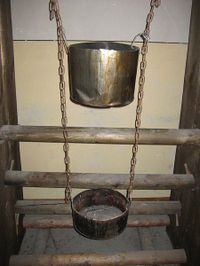Reading the pseudo-world-weary way in which some on the right in America still defend the use of torture, however euphemistically rephrased, always takes me back to Orwell. Some want to define "actual" torture in ways that mean that freezing someone to near-death, or forcing them into weeks of sleeplessness, or stringing them up in excruciating ways until they break, or isolating them indefinitely from any sensory perception, is somehow an "humane alternative" or "not-torture". What they miss - or rather what they refuse to address - is that torture cannot be defined by specific techniques and legally isn't.
 be torture. It's not even, as the former vice-president would say, a splash of water on the face. It's a mere drip. But even a drip, sustained long and relentlessly enough, can break a human being. The test for torture is not whether it leaves brutal physical marks or not (that was the Gestapo standard). The test for torture is whether it is of sufficient immediate or cumulative force to rob the capacity of a human being to say voluntarily what he or she knows to be true. It is the imposition of sufficient coercion to destroy an individual's ability to resist giving some kind of answer, true or false, or some unknowable, random blend of the two.
be torture. It's not even, as the former vice-president would say, a splash of water on the face. It's a mere drip. But even a drip, sustained long and relentlessly enough, can break a human being. The test for torture is not whether it leaves brutal physical marks or not (that was the Gestapo standard). The test for torture is whether it is of sufficient immediate or cumulative force to rob the capacity of a human being to say voluntarily what he or she knows to be true. It is the imposition of sufficient coercion to destroy an individual's ability to resist giving some kind of answer, true or false, or some unknowable, random blend of the two.The point of this can therefore never be to get truly reliable information. The purpose is to get answers the victim imagines the torturers want to hear. This might be the truth; or it might be a desperate untruth. The point is that the tortured is brought to the point when such distinctions are less meaningful than simply ending the ordeal.
Moreover, the power that torture gives to torturers is an inherently total and invariably corrupting one. It darkens the souls of those tasked with carrying it out; and more profoundly poisons the entire polity that authorizes it. I still cannot quite believe that conservatives of all people wanted to give this kind of total power to an executive whose authority exists outside the law and is answerable only to a single "accountability moment" every four years. I also find it hard to believe that because of the example set by the commander-in-chief, so many American servicemembers in Iraq and elsewhere came to believe that torture was justified, and acted accordingly. By 2005, as Petraeus recognized, the rot had gone deep.
But back to Orwell. For Orwell, in Nineteen Eighty-Four particularly, eschewing torture is about saving the possibility of truth (the best other evocations of this point that I've come across can be found in plays: The Crucible and, more recently, The Pillowman). The torture of Winston Smith is designed specifically to force him to say that two and two equals five, just as the point of the "enhanced interrogation techniques" once used on John McCain was to get him to say things that were untrue. And it worked. If it really works, torture will force someone actually to believe that two and two equals five. And when you look at the mental case that became of the tortured American, Jose Padilla, you see how that can happen. The man was made mad by Bush-authorized brutality and sadism. (And the original charges against him were reduced to something not even Cheney Republicans would imagine deserve torture. Padilla, in fact, is the classic "ticking time bomb" case they cite so often. They claimed he had one; they tortured him because of it; and it was, of course, untrue. They carried on torturing him, until he could barely speak without spasming. And then they got him on pretty trivial charges.)
Does torture become something less awful when we do it? Is it a function of "paranoia" to worry about it when it's done by Americans or Brits? When a "good man" like George W. Bush does it? When a personally humane person like Donald Rumsfeld does it? When we know our motives are good ones? Orwell's answer is categorical. That's why he set Nineteen-Eighty-Four in his native England:
The scene of the book is laid in Britain in order to emphasize that the English-speaking races are not innately better than anyone else.
Do you believe that or not? Churchill didn't, which is why, despite a 9/11 every week in London during the Blitz, he never capitulated to the evil he was fighting against. Bush and Cheney, in contrast, made it standard operating procedure after one attack by people armed with nothing but box-cutters and our fear. History, as John Ashcroft once said, will not be kind.